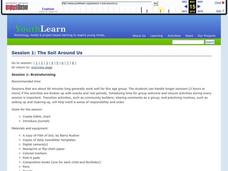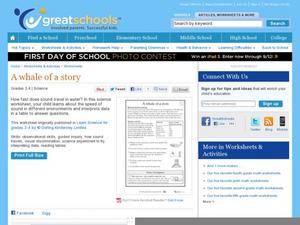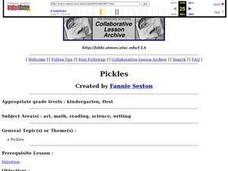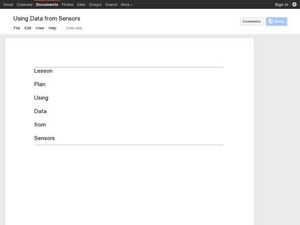Curated OER
"The Soil Around Us" Project
Young geographers collect samples of different kinds of soil to match to the soil terms in Barry Rudner's rhyming book Filet of Soil: dirt, mud, dust, soot, etc. They start a glossary for the project on index cards or large sheets of...
University of Minnesota
Attention and Sensory Processing
Ever wondered how your brain manages all of the information it receives every second of every day? The sights, the sounds, the smells ... each one filed away for later use or moved to the front of the line so your body can react. Through...
Curated OER
My Five Senses
Students explore their 5 senses. In this 5 senses instructional activity, students participate in activities that require them to use the senses of smell, touch, hearing, taste, and sight.
Curated OER
Senses
In this early childhood senses worksheet, learners match the words sight, touch, hear, taste, and smell to the appropriate body parts.
Curated OER
Understanding Eyeglasses
Kids wonder about eyeglasses, and why people have to wear eyeglasses. This should shed some light on the subject. Learners develop an understanding about eyelgasses, and also other visual aids, such as magnifying glasses. In fact, they...
Curated OER
Observing and Discovering Using Our Senses
Third graders decide if it is possible to identify something using only the senses of taste, smell and hearing. They listen to a CD of animal sounds with their eyes closed and attempt to identify the animal. Next, they smell an air...
Discovery Education
Market Research and Design: The Headphone Challenge
Watch augmented reality bring classrooms to life. Scholars work in groups to design, build, and market a new pair of headphones meant for children under three. They use an augmented reality app to show their headphones in action as they...
Curated OER
Senses Used to Observe Matter
In this senses worksheet, students will complete a graphic organizer by writing in the 5 senses: sight, hearing, taste, touch, and smell.
Curated OER
Sense-sational
Students investigate the five senses. They participate in the lesson for one week with each day devoted to one sense being sight, taste, sound, smell, and touch. They also cover the concept of being part of a global community where one...
Curated OER
Five Senses
Students listen to the book "My Five Senses." They work together to classify fifteen objects by the sense that they affect. They discuss the sense organs and complete a chart. Finally, they sort mystery items from a bag which the teacher...
Curated OER
The Senses: Hearing
In this sense of hearing worksheet, students research what the ear parts eardrum, hammer, anvil, stirrup, and cochlea are and what they do, write the results, and draw what they hear on a listening walk. Students answer six questions.
Curated OER
Lesson Plan Seven: Sensorama
Students identify five senses, and use their senses of touch, sight, hearing, smell, and taste to distinguish different objects, sounds, smells and tastes, and write their answers in the booklet.
Curated OER
A Science Experiment With Crayfish
A crayfish can lead to a science experiment involving habitats, animal behavior, and anatomy..
Curated OER
A Whale of a Story
Does sound travel faster in water or in the air? Put the question to the test with a science experiment. After reviewing a table of data, third and fourth graders decide which statements are true and which ones are false. The bottom of...
ARKive
Nocturnal Animals
How do those nocturnal animals see in the dark? This perplexing question does have an answer. First, little ones use their sense of touch to determine the name of a mystery object, then they listen closely to identify various animals by...
Curated OER
Pickles
Young learners compare healthy foods to junk foods. They examine the growing process of a vegetable from a seed all the way to maturity. The book, The Magic School Bus in a Pickle is used. Some nice cross-curricular activities in math,...
Curated OER
Exploring Learned and Innate Behavior
Learners explore the differences between learned and innate behavior among humans and monkeys. They complete an assignment and read articles about two studies, which used similar test methods to show that infants and monkeys share an...
Curated OER
Using Data from Sensors
Beginning with a discussion about using technology to collect data, this resource includes a video about the next Mars rover as an example. Young scientists are taught that filtering is necessary before collected data can be analyzed....
Curated OER
Descending to the Challenge: Developing Documentaries About the Deep Ocean
The video clip that comprises the warm up is not available, but the related article from The New York Times and the movie trailer for Aliens of the Deep are, leaving enough material to make this a fascinating lesson on deep-sea...
Curated OER
The Senses: Hearing and Sight
Eighth graders consider how they use their senses. In this biology lesson plan, 8th graders understand the definition of a disability and how it affects Americans who are hearing impaired or deaf, and those Americans who are visually...
Curated OER
Touch and Feel Box
Students investigate their sense of touch to help become more descriptive with their observations. In this sensory lesson plan, students reach inside a box to feel an object then guess what it is. Students then use both senses of touch...
Curated OER
Using the senses
Young scholars use their senses to compare a frog and a hamster. In this animals comparison lesson plan, students get into groups and observe, smell, feel, and listen to what their animals are like, and classify them into categories.
Curated OER
Using My Senses
Students observe crickets in the terrarium. Have them record in their journal any evidence of crickets having senses. Then they answer questions like these: How do they use their sense organs? Where are they are located?
Curated OER
Use Your Senses
In this human senses worksheet, students make lists of the things they can see, hear, smell and feel. They compare their own list to a partner's list to earn points.

























